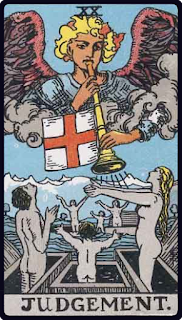
With the great journey at its end, our lives pass on, and into the next plane we will venture, but before we can take that step, we must be judged. The Judgement card represents our conscience, guilt, criticism, and analysis. Echoing the Justice card which sought to emphasis the neutrality of the judiciary in moral affairs passing judgement based on justification rather than moral absolution, it is worth remembering that no court finds the defendant innocent, they only ever find the defendant guilty or not guilty.
For those who enjoy video games, the story of Undertale mirrors that of the Major Arcana, with Sans standing in judgement of the player at journey’s end, when even if the player chose true pacifism, he does not find the player innocent but rather praises them for not succumbing to temptation.
In the upright state the Judgement card calls upon us to consider the life we have lived and whether we feel guilt or remorse where we admit fault, or whether we feel justified and able to defend ourselves and our actions when they are called into question. Analysis and criticism of the self is the skill we are implored to utilise in this moment, for they are our best hope at achieving objectivity. Judgement is our last chance to make amends, lest we accept fate and give ourselves over to whatever sentence is passed.
In the inverted state the Judgement card represents delay, indecision, a lack of clarity, and our efforts to bargain. In the inverted state our focus shifts from justifying our actions where our conscience has been decided, and turns to the ambiguity of our actions; we are called to reflect upon the decisions we have made that we do not understand, no man can see beyond a choice he does not understand, and no soul can pass beyond this life without first making peace with it, in popular culture this belief informs the concept of unfinished business, which is employed as a narrative trope to explain the persistence of the spirit in the form of ghosts and apparitions after death, representing souls that are not capable of releasing their attachment to the Earthy plane.
In the Rider-Waite deck, atop the Judgement card can be seen the archangel Gabriel, the third and final of the seven archangels to appear in the Major Arcana. Gabriel blows his horn to announce the arrival of Judgement Day echoing the Book of Revelation; below the clouds are people standing in what first appear to be boats floating on a sea but are in fact coffins. Here the coffins represent the confines of the human body as a vessel for the soul, with the depiction of people standing within them representing the souls brought to life once more to be freed and called forth to Heaven where they will be judged.
From Gabriel’s horn flies a flag with a white background representing innocence and purity, with a red cross representing sacrifice, the crucifix, redemption, and absolution. The sea upon which the coffins float is disturbed and represents the cognitive dissonance of being and unbeing.
In self-reflection Judgement can be a prompt to consider your moral compass and ask yourself whether you agree with your actions both in and out of context and to consider whether your future self will be comfortable with the choices you made. Where the Tower represents the destination at the end of the path we walk, Judgement determines the route we take to get there. Judgement is inextricably linked to the choices we make, and as such it influences the outcome. When we go against our better judgement, our sense of guilt gets amplified when things don’t turn out the way we’d hoped we then judge ourselves in hindsight.
As said before, guilt can last in perpetuity if we allow it to, but related to this notion is the idea of shame, an emotion that is rather unique in that it is one of the few emotions we experience that does not originate in the self but rather it is put there instead by someone or some external influence. Shame is what we feel when we fail to meet the expectations of an external influence. We do not inherently feel shame for our own failures, we learn to feel ashamed of our failures from others.
Judgement can serve as a prompt to consider your actions and the weight of those decisions that you will carry going forward and to consider whether that is a commitment you want to make.
Ask yourself “Do I understand the risk?” and “Is this a risk worth taking?” when you are about to make a choice. When taken in reflection ask yourself “Can I release my guilt?” and remember that judging yourself in hindsight knowing what you know now is fundamentally unfair as through that judgement you are punishing your past self for what they did not know and feeling shame in the present as a result.

No comments:
Post a Comment
All comments are moderated before they are published. If you want your comment to remain private please state that clearly.